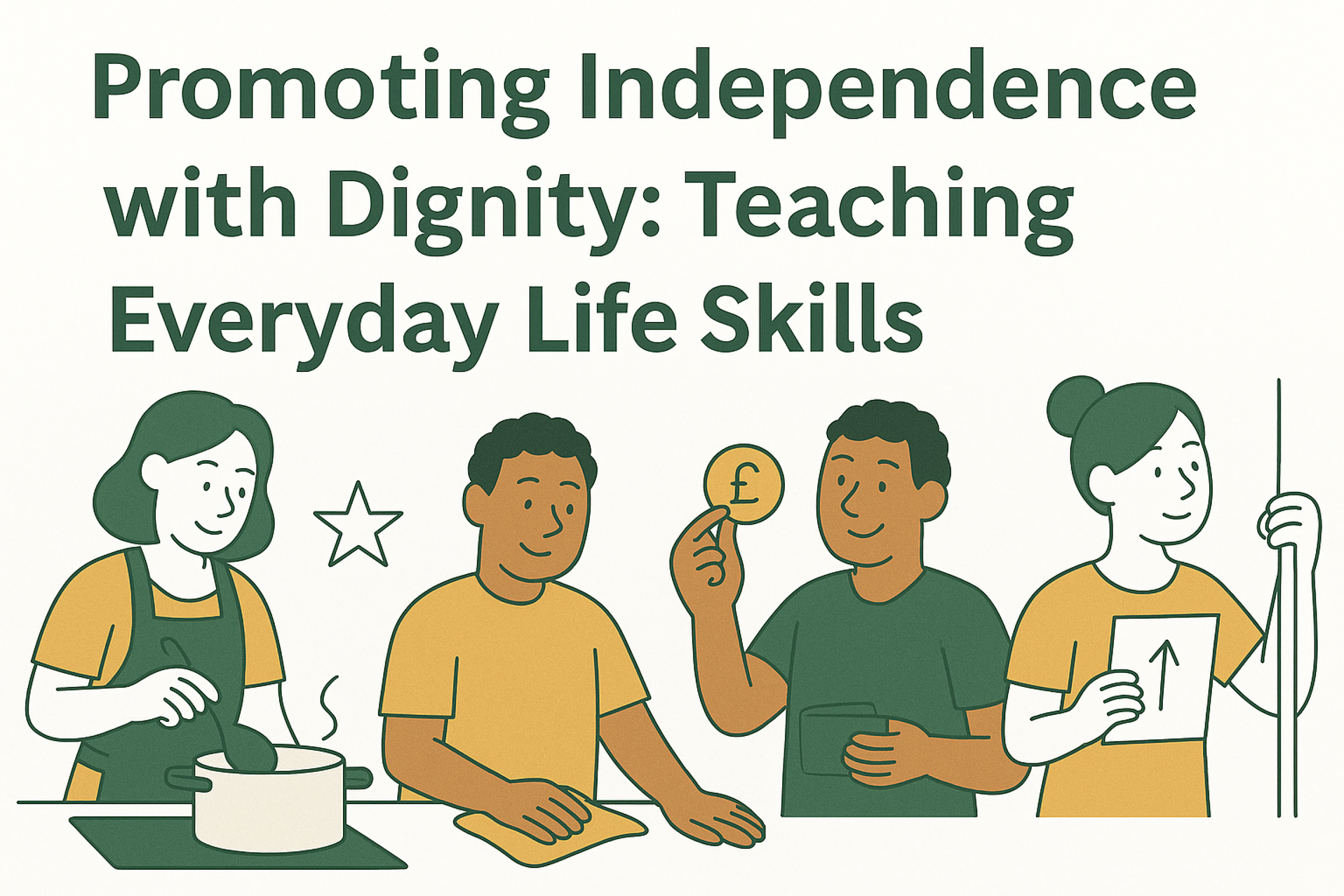Promoting Independence with Dignity
Introduction
For adults with learning disabilities or autism, independence is not defined by doing everything alone, but by being in control of their own lives with the right support. Promoting independence is a fundamental part of supporting wellbeing and dignity. However, this must be approached with compassion, patience, and creativity.
At Has2bhappy, we believe every adult—regardless of ability—deserves the opportunity to learn, grow, and contribute meaningfully to their own daily routines. This article explores how life skills can be taught with dignity, backed by research and real-world practices.
Why Independence Matters
Dignity and Self-Worth
Being able to make decisions, prepare food, manage hygiene, or go out safely fosters self-esteem. Research shows that people who have more control over their daily lives experience higher emotional wellbeing and reduced feelings of helplessness.
Reference: Schalock, R. & Verdugo, M. (2002). Handbook on Quality of Life for Human Service Practitioners—describes autonomy as a key quality-of-life domain.
Preventing Learned Helplessness
When adults with disabilities are over-assisted, they may become passive or disengaged—what psychologists call learned helplessness. This is not a lack of ability, but a result of lack of opportunity.
Research Insight: According to a 2019 study in Journal of Applied Research in Intellectual Disabilities, skill-building programs improved self-efficacy and engagement in daily life among adults with intellectual disabilities (Van der Meer et al., 2019).
Teaching Everyday Life Skills with Dignity
Teaching life skills means more than just giving instructions—it’s about coaching, modelling, encouraging autonomy, and treating mistakes as learning, not failure.
1. Cooking with Confidence
Why it matters: Cooking is a gateway to independence, choice, and health.
Strategies:
Use visual recipes (e.g., photos of ingredients and steps)
Break tasks into micro-steps: “Open the drawer” → “Get the spoon”
Use assistive tools: talking scales, color-coded utensils
Start with shared cooking, then move to independent snack prep
Real-World Example:
James now prepares his own breakfast three times a week. Staff laminated a photo recipe for cereal and toast, and placed each item in a consistent place. After 3 months of support, he can now manage without prompts.
Evidence: A study by Browder et al. (2007) in Research and Practice for Persons with Severe Disabilities found that adults learned cooking tasks faster when taught using visual task analysis paired with physical prompting and fading.
2. Personal Hygiene Without Shame
Why it matters: Good hygiene supports dignity, social acceptance, and health.
Strategies:
Use sequenced visuals for brushing teeth, washing, changing clothes
Incorporate sensory-friendly routines (e.g., warming towels, soft lighting)
Let individuals choose: “Would you like mint or strawberry toothpaste?”
Offer positive reinforcement, not correction
Example:
Samantha, who is sensitive to noise and smells, disliked showers. Staff used a social story, provided a scented towel she chose herself, and introduced music she enjoyed. She now showers every other day with minimal support.
Tool: The UK’s Easyhealth.org.uk provides excellent hygiene guides in easy-read formats with images.
3. Managing Money and Making Choices
Why it matters: Handling money, however basic, gives people more control and understanding of their environment.
Strategies:
Use real coins and physical shopping experiences
Practice with choice boards and budget cards
Celebrate small wins: choosing a snack, paying with support
Real-World Example:
Anthony wanted to buy crisps from the corner shop. Staff used plastic coin sets and role-played purchases. After 4 weeks, he walked to the shop with his support worker and paid himself with verbal prompting.
Research: A study in British Journal of Learning Disabilities (2014) showed that even basic money management training improves perceived autonomy in adults with IDD.
4. Taking Care of Their Own Space
Why it matters: Cleaning, organising, and decorating their own space reinforces a sense of ownership and pride.
Strategies:
Create a “My House Job” routine chart
Use song cues (e.g., 2-minute clean-up songs)
Provide adapted tools (e.g., light-weight vacuums, long-handled dusters)
Example:
Three service users created their own cleaning music playlist. Now, they enjoy 10-minute tidy sessions every morning, with a staff member supporting transitions and encouraging positive feedback.
5. Travel and Community Navigation
Why it matters: The ability to access the community builds freedom and social connection.
Strategies:
Use photo-mapped travel guides
Practice travel with increasing distance and less prompting
Prepare for sensory needs (e.g., ear defenders, fidget aids)
Example:
Maria learned to take a short walk to the postbox and back using a photo keychain. She now confidently posts letters with just a shadowing staff member nearby.
Global Model: Programs in Sweden and the Netherlands promote supported travel training with excellent success rates (source: European Association of Service Providers for Persons with Disabilities, 2021).
Dignity in the Process: Core Principles
Choice over Compliance
Always offer choices, even in routines. Ask: "Would you like to do this now or in 10 minutes?"Support Don’t Take Over
Let the person struggle a little if safe—it’s part of learning. Prompt only as much as needed.Celebrate Progress, Not Perfection
Every step matters. Take time to reflect and say “Well done—you did that.”Make It Personal
Tailor the skill-building to the person’s interests. If they love animals, link cleaning skills to feeding pets.
Conclusion: Growth is a Right, Not a Privilege
At Has2bhappy, promoting independence is not about reducing support—it’s about giving people more power over their own lives in ways that feel safe, achievable, and joyful.
Independence does not mean isolation. It means being involved—at your own pace, in your own way, with the dignity and respect that every person deserves.
References
Schalock, R. & Verdugo, M. (2002). Handbook on Quality of Life for Human Service Practitioners.
Van der Meer, L. et al. (2019). Teaching life skills to adults with intellectual disabilities. JARID.
Browder, D. et al. (2007). Use of picture prompts and modeling in teaching cooking. Research and Practice for Persons with Severe Disabilities.
British Journal of Learning Disabilities (2014). Impact of basic money skills training on autonomy.
European Association of Service Providers for Persons with Disabilities (2021). Independent Living & Community Integration Projects.
EasyHealth.org.uk – Accessible hygiene and self-care resources.

